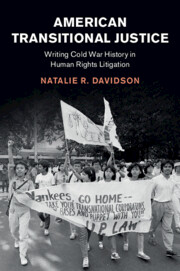Book contents
- American Transitional Justice
- Human Rights in History
- American Transitional Justice
- Copyright page
- Contents
- Figures
- Acknowledgments
- 1 Introduction
- 2 Alien Tort Statute Litigation in Legal Practice and the Legal Imagination
- 3 “Foreign Torture, American Justice”
- 4 Filártiga in Paraguay
- 5 Narrating the Marcos Regime in US Courts
- 6 The Marcos Case and Transitional Justice in the Philippines
- 7 Conclusion
- Book part
- Bibliography
- Index
7 - Conclusion
Published online by Cambridge University Press: 04 June 2020
- American Transitional Justice
- Human Rights in History
- American Transitional Justice
- Copyright page
- Contents
- Figures
- Acknowledgments
- 1 Introduction
- 2 Alien Tort Statute Litigation in Legal Practice and the Legal Imagination
- 3 “Foreign Torture, American Justice”
- 4 Filártiga in Paraguay
- 5 Narrating the Marcos Regime in US Courts
- 6 The Marcos Case and Transitional Justice in the Philippines
- 7 Conclusion
- Book part
- Bibliography
- Index
Summary
The conclusion draws together the book’s findings and arguments, and elaborates on their historical and normative–legal implications today. It calls for a history of human rights that explores the multiple social and narrative practices through which the human rights discourse has been deployed and sometimes transformed; in other words, it calls for an unabashedly interdisciplinary legal–historical–ethnographic approach to human rights.
Keywords
- Type
- Chapter
- Information
- American Transitional JusticeWriting Cold War History in Human Rights Litigation, pp. 180 - 190Publisher: Cambridge University PressPrint publication year: 2020

